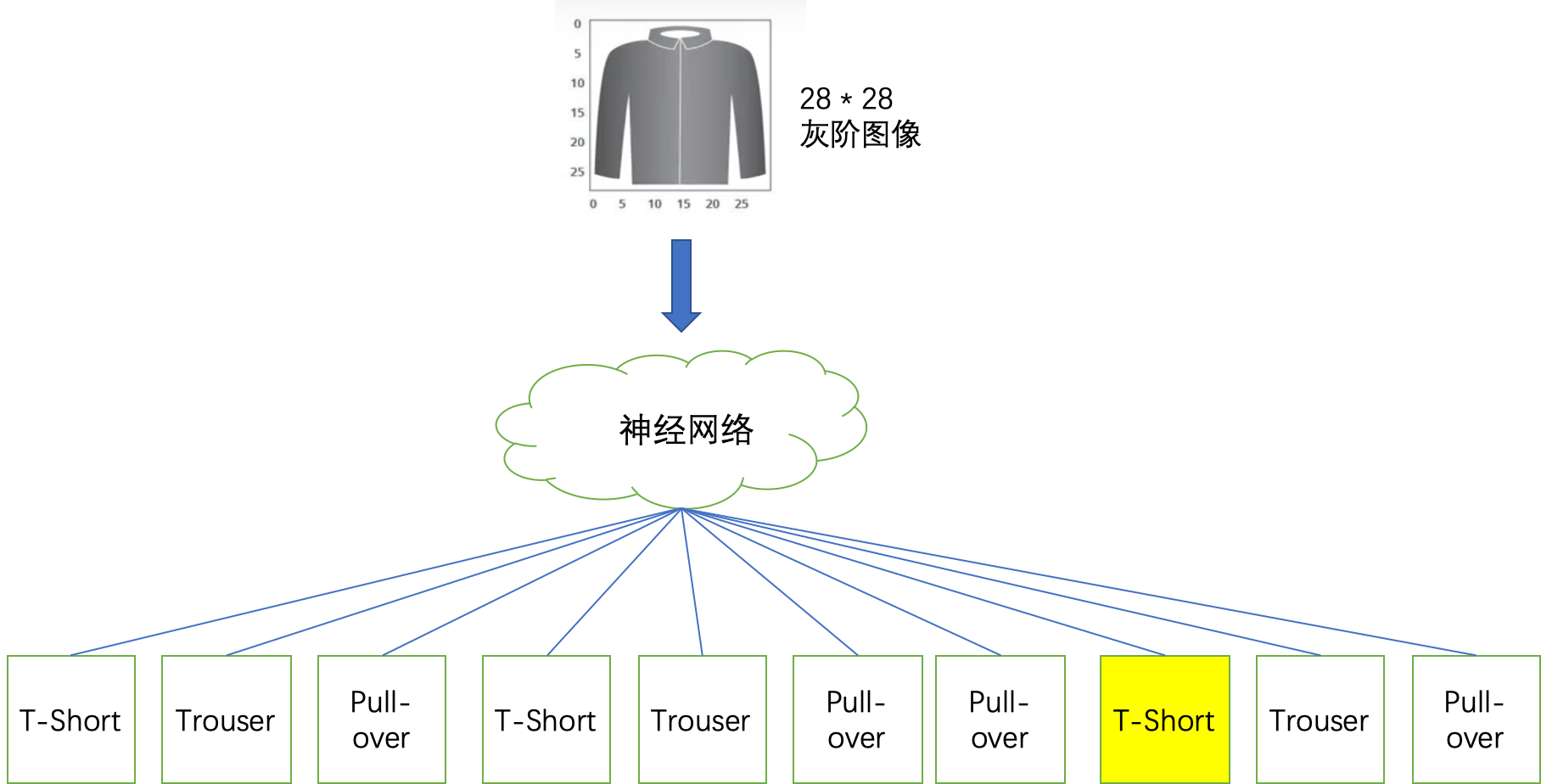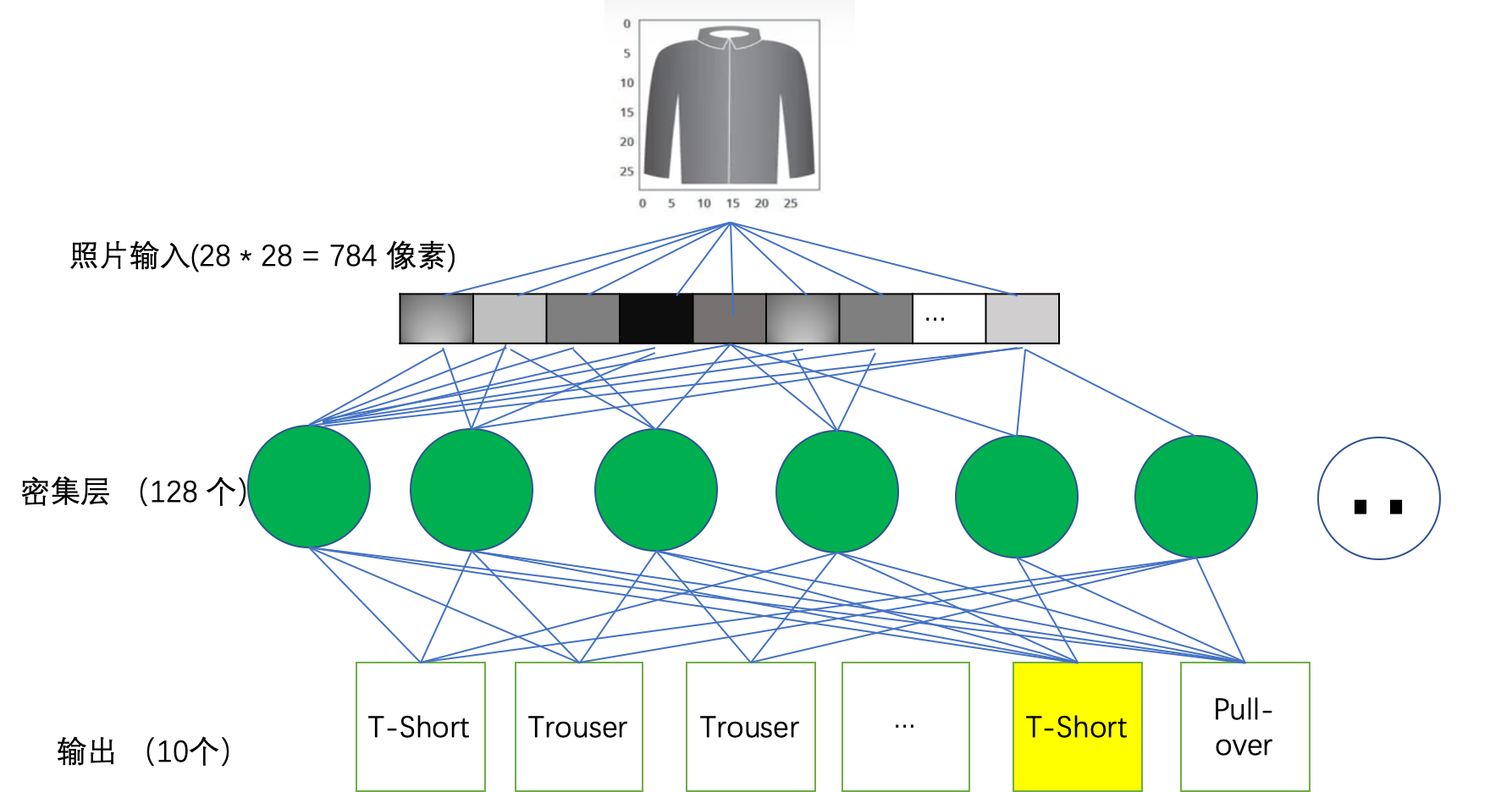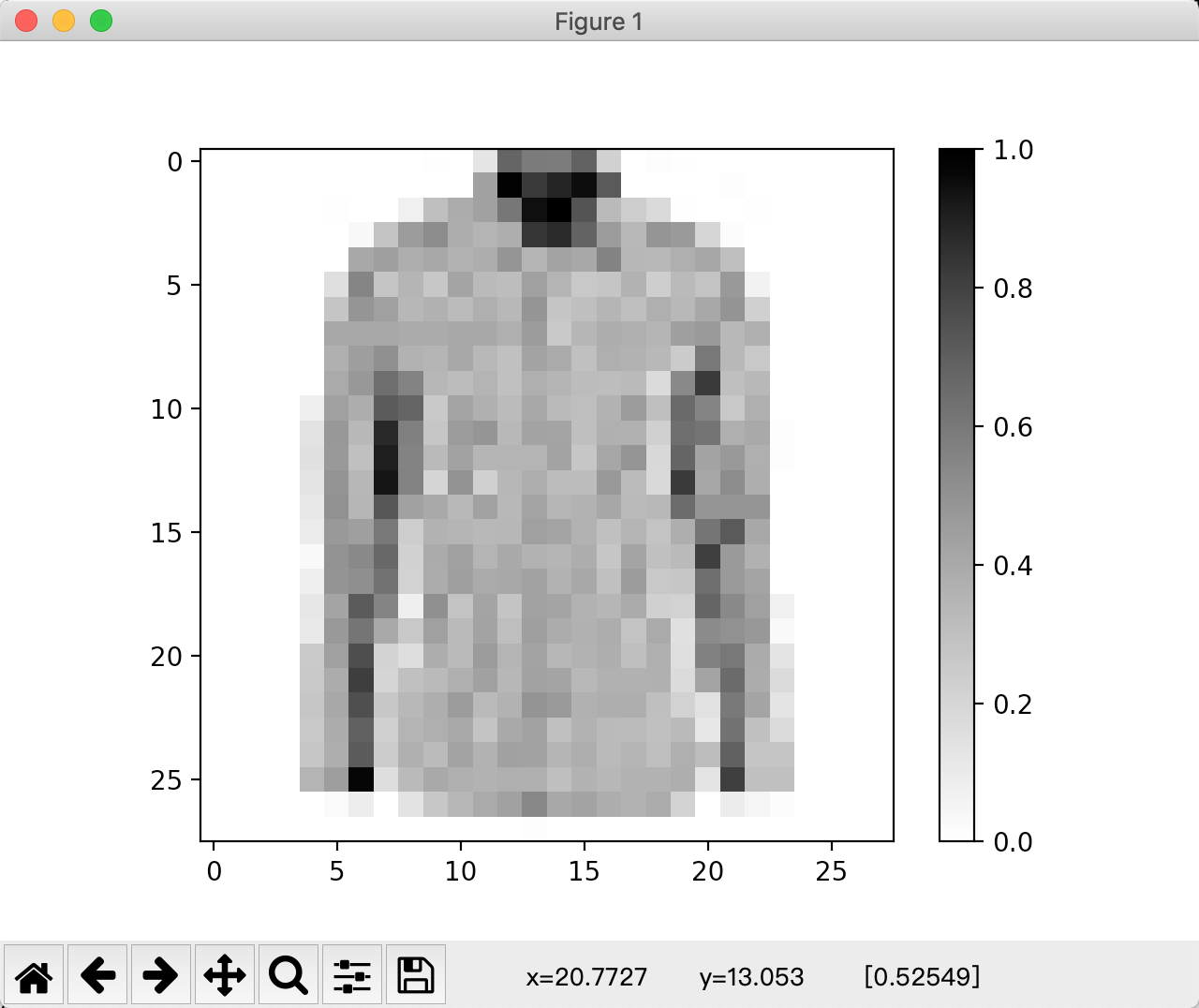03 - Fashion MINIST识别衣服(多分类问题)
目标:使用Fashion MINIST 数据集训练一个可以自动识别衣服的神经网络。
Fashion MINIST 数据集参考链接
https://github.com/zalandoresearch/fashion-mnist

图 1-1 创建一个可以识别衣服的神经网络 |
分析步骤

图1-2 分析结果 |
测试集一共有70000条, 使用60000条进行训练, 10000条进行测试。
第一步:数据表示,这个过程叫做扁平化(Flatten)
将输入的图像转换成一个由784个橡素组成的一维数组
使用代码表示如下
tf.keras.layers.Flatten(input_shape=(28,28,1))
第二步:密集层, 我们有128个单元
tf.keras.layers.Dense(128, activtion=tf.nn.relu)
第三步:输出表示
| 标签 | 类别 | 概率(总和 = 1) |
| 0 | T-Shirt | |
| 1 | Trouser | |
| 2 | Pullover | |
| 3 | Dress | |
| 4 | Coat | |
| 5 | Sandal | |
| 6 | Shirt | |
| 7 | Sneaker | |
| 8 | Bag | |
| 9 | Ankle Boot |
即神经网络最终的输出结果是一个概率分布, 测试数据中每个照片对应的类别的概率分布
tf.keras.layers.Dense(10, activation=tf.nn.softmax)
Coading
第一步:安装环境
pip install tenserflow pip install -U tensorflow_datasets
第二步:导入数据包
# Import TensorFlow Datasets import tensorflow_datasets as tfds tfds.disable_progress_bar() # Helper libraries import math import numpy as np import matplotlib.pyplot as plt
第三步:导入Fashion Minist数据集
# Import Fashion minist dataset dataset, metadata = tfds.load('fashion_mnist', as_supervised=True, with_info=True) train_dataset, test_dataset = dataset['train'], dataset['test']
打印查看minst 信息
print(metadata)
tfds.core.DatasetInfo( name='fashion_mnist', version=1.0.0, description='Fashion-MNIST is a dataset of Zalando's article images consisting of a training set of 60,000 examples and a test set of 10,000 examples. Each example is a 28x28 grayscale image, associated with a label from 10 classes.', homepage='https://github.com/zalandoresearch/fashion-mnist', features=FeaturesDict({ 'image': Image(shape=(28, 28, 1), dtype=tf.uint8), 'label': ClassLabel(shape=(), dtype=tf.int64, num_classes=10), }), total_num_examples=70000, splits={ 'test': 10000, 'train': 60000, }, supervised_keys=('image', 'label'), citation="""@article{DBLP:journals/corr/abs-1708-07747, author = {Han Xiao and Kashif Rasul and Roland Vollgraf}, title = {Fashion-MNIST: a Novel Image Dataset for Benchmarking Machine Learning Algorithms}, journal = {CoRR}, volume = {abs/1708.07747}, year = {2017}, url = {http://arxiv.org/abs/1708.07747}, archivePrefix = {arXiv}, eprint = {1708.07747}, timestamp = {Mon, 13 Aug 2018 16:47:27 +0200}, biburl = {https://dblp.org/rec/bib/journals/corr/abs-1708-07747}, bibsource = {dblp computer science bibliography, https://dblp.org} }""", redistribution_info=, )
print(dataset)
{
'test': <_OptionsDataset shapes: ((28, 28, 1), ()), types: (tf.uint8, tf.int64)>,
'train': <_OptionsDataset shapes: ((28, 28, 1), ()), types: (tf.uint8, tf.int64)>
}
查看单张照片信息
[[ 0 0 0 0 0 0 0 0 0 1 0 32 172 151 150 176 56 0 2 1 0 0 0 0 0 0 0 0] [ 0 0 0 0 0 0 0 0 0 0 0 111 252 211 227 243 183 0 0 0 0 2 0 0 0 0 0 0] [ 0 0 0 0 0 1 0 0 19 78 99 111 155 242 255 188 83 61 46 1 0 0 1 0 0 0 0 0] [ 0 0 0 0 0 0 9 73 117 133 98 90 97 213 222 175 118 85 123 119 50 4 0 0 0 0 0 0] [ 0 0 0 0 0 0 103 113 97 103 91 98 124 89 109 104 143 87 85 96 105 78 0 0 0 0 0 0] [ 0 0 0 0 0 39 140 71 89 68 108 83 80 112 90 67 70 91 59 83 73 120 16 0 0 0 0 0] [ 0 0 0 0 0 71 124 112 87 93 82 96 85 124 70 78 89 78 96 86 103 125 57 0 0 0 0 0] [ 0 0 0 0 0 103 103 103 100 100 104 104 96 117 67 88 98 96 89 113 119 86 96 0 0 0 0 0] [ 0 0 0 0 0 94 115 129 92 89 103 86 75 109 100 75 96 92 85 64 154 86 67 0 0 0 0 0] [ 0 0 0 0 0 101 121 164 143 87 81 90 76 96 89 81 80 83 45 137 211 77 86 0 0 0 0 0] [ 0 0 0 0 20 112 98 181 173 66 108 94 82 104 83 79 92 118 77 168 141 67 96 0 0 0 0 0] [ 0 0 0 0 35 121 86 224 146 69 117 124 86 109 107 78 94 93 58 163 158 96 102 2 0 0 0 0] [ 0 0 0 0 38 120 76 232 143 83 110 89 90 90 109 69 105 123 48 172 109 120 96 3 0 0 0 0] [ 0 0 0 0 33 125 87 237 144 52 126 57 87 97 81 81 120 82 47 211 105 134 97 0 0 0 0 0] [ 0 0 0 0 29 128 88 186 111 102 85 110 86 108 88 92 105 83 85 165 124 124 124 0 0 0 0 0] [ 0 0 0 0 25 120 113 154 61 92 89 86 87 112 107 92 76 90 73 97 156 183 103 0 0 0 0 0] [ 0 0 0 0 7 126 137 170 56 100 111 90 102 91 89 98 69 108 76 83 206 119 93 0 0 0 0 0] [ 0 0 0 0 20 125 131 160 55 99 114 101 104 110 92 104 75 117 67 69 164 119 108 0 0 0 0 0] [ 0 0 0 0 30 107 181 141 20 129 73 108 72 110 107 92 88 101 58 55 172 137 112 19 0 0 0 0] [ 0 0 0 0 27 120 156 102 67 112 83 109 79 113 99 93 98 73 101 38 135 128 121 8 0 0 0 0] [ 0 0 0 0 65 112 194 55 41 98 83 118 90 109 87 92 97 77 94 40 145 154 100 34 0 0 0 0] [ 0 0 0 0 67 99 208 52 76 83 94 111 87 110 108 86 93 93 94 43 108 167 99 43 0 0 0 0] [ 0 0 0 0 69 103 193 68 85 97 117 83 91 125 119 93 97 97 78 55 37 153 107 34 0 0 0 0] [ 0 0 0 0 67 99 177 57 90 96 102 72 102 110 76 92 83 82 75 83 30 160 75 45 0 0 0 0] [ 0 0 0 0 69 97 181 62 94 82 109 92 111 110 89 97 83 89 78 96 80 177 70 70 0 0 0 0] [ 0 0 0 0 90 115 246 41 83 102 96 91 96 96 78 92 87 91 91 97 34 206 76 75 0 0 0 0] [ 0 0 0 0 0 6 23 0 35 68 87 101 111 139 104 109 98 91 99 55 0 24 13 4 0 0 0 0] [ 0 0 0 0 0 0 0 0 0 0 0 0 0 2 0 0 0 0 0 0 0 0 0 0 0 0 0 0]]
所有的值都在[0,255]之间
第四步:设置输出数据
class_names = ['T-shirt/top', 'Trouser', 'Pullover', 'Dress', 'Coat', 'Sandal', 'Shirt', 'Sneaker', 'Bag', 'Ankle boot']
第五步: 查看数据
num_train_examples = metadata.splits['train'].num_examples num_test_examples = metadata.splits['test'].num_examples print("Number of training examples: {}".format(num_train_examples)) print("Number of test examples: {}".format(num_test_examples))
运行结果
Number of training examples: 60000
Number of test examples: 10000
有 60000条训练数据, 10000 条测试数据
第六步:处理数据
每个数据的像素值在[0, 255]之间,为了能让模型损失值最小, 将值参数化到[0,1]
所以这里创建normalize函数,且应用到每张照片
def normalize(images, labels): images = tf.cast(images, tf.float32) images /= 255 return images, labels # The map function applies the normalize function to each element in the train # and test datasets train_dataset = train_dataset.map(normalize) test_dataset = test_dataset.map(normalize) # The first time you use the dataset, the images will be loaded from disk # Caching will keep them in memory, making training faster train_dataset = train_dataset.cache() test_dataset = test_dataset.cache()
第七步: 查看一张照片
# Take a single image, and remove the color dimension by reshaping for image, label in test_dataset.take(1): break image = image.numpy().reshape((28,28)) # Plot the image - voila a piece of fashion clothing plt.figure() plt.imshow(image, cmap=plt.cm.binary) plt.colorbar() plt.grid(False) plt.show()
运行结果

图1-3单张照片显示结果 |
第八步:显示前25张照片, 确认数据是否正确
plt.figure(figsize=(10,10)) i = 0 for (image, label) in test_dataset.take(25): image = image.numpy().reshape((28,28)) plt.subplot(5,5,i+1) plt.xticks([]) plt.yticks([]) plt.grid(False) plt.imshow(image, cmap=plt.cm.binary) plt.xlabel(class_names[label]) i += 1 plt.show()
运行结果

图1-4 确认后的照片 |
第九步: 设置训练模型
model = tf.keras.Sequential([ tf.keras.layers.Flatten(input_shape=(28, 28, 1)), tf.keras.layers.Dense(128, activation=tf.nn.relu), tf.keras.layers.Dense(10, activation=tf.nn.softmax) ])
这个网络拥有3层
第一层 input , 即输入层 - tf.keras.layers.Flatten
这层将28 * 28 的二维矩阵变换成一维的 728 像素的一维数组。
第二层,隐藏的层, tf.keras.layers.Dense , 密集连接 128 个单元的神经,每个单元节点都会从第一层中接收
输入信息,使用权重信息来学习,并计算出结果。
第三层,输出层,tf.keras.layers.Dense , 一个10个节点的输出概率层(softmax), 每个节点表示一个服饰类别。
每个节点根据输入信息与权重值,学习并计算出[0,1]之间的一个值, 所有节点的值相加为1。
如果在第二层增加更多的神经单元,则准确率会更高, 比如实验加到1024个,时间会更长, 但精度会提高。
第十步:编译模型
model.compile(optimizer='adam', loss='sparse_categorical_crossentropy', metrics=['accuracy'])
在编译模型之前,需要定义损失函数与优化函数。
第十一步:训练模型
BATCH_SIZE = 32
train_dataset = train_dataset.repeat().shuffle(num_train_examples).batch(BATCH_SIZE)
test_dataset = test_dataset.batch(BATCH_SIZE)
model.fit(train_dataset, epochs=5, steps_per_epoch=math.ceil(num_train_examples/BATCH_SIZE))
* 使用接口 train_dataset.repeat() 函数循环执行
* dataset.shuffle(60000) 可以让模型数据乱序,让模型无法从读取顺序进行学习。
* dataset.batch(32) 告诉模型使用32个照片来更新一次
* 训练模型使用 model.fit 函数, epochs = 5 限制模型最多循环学习5次,所以最多可以有 5 * 60000 = 300000 样本
输出结果
Train for 1875 steps
Epoch 1/5
1875/1875 [==============================] - 15s 8ms/step - loss: 0.5014 - accuracy: 0.8243
Epoch 2/5
1875/1875 [==============================] - 5s 2ms/step - loss: 0.3696 - accuracy: 0.8680
Epoch 3/5
1875/1875 [==============================] - 5s 3ms/step - loss: 0.3353 - accuracy: 0.8775
Epoch 4/5
1875/1875 [==============================] - 5s 2ms/step - loss: 0.3124 - accuracy: 0.8862
Epoch 5/5
1875/1875 [==============================] - 5s 2ms/step - loss: 0.2969 - accuracy: 0.8913
如果修改测试epochs的值, 将该值增加到30 , 会有什么效果
Train for 1875 steps Epoch 1/30 1875/1875 [==============================] - 14s 7ms/step - loss: 0.4932 - accuracy: 0.8260 Epoch 2/30 1875/1875 [==============================] - 4s 2ms/step - loss: 0.3762 - accuracy: 0.8633 Epoch 3/30 1875/1875 [==============================] - 4s 2ms/step - loss: 0.3342 - accuracy: 0.8785 Epoch 4/30 1875/1875 [==============================] - 4s 2ms/step - loss: 0.3165 - accuracy: 0.8834 Epoch 5/30 1875/1875 [==============================] - 4s 2ms/step - loss: 0.2951 - accuracy: 0.8915 Epoch 6/30 1875/1875 [==============================] - 4s 2ms/step - loss: 0.2796 - accuracy: 0.8960 Epoch 7/30 1875/1875 [==============================] - 4s 2ms/step - loss: 0.2640 - accuracy: 0.9021 Epoch 8/30 1875/1875 [==============================] - 4s 2ms/step - loss: 0.2585 - accuracy: 0.9040 Epoch 9/30 1875/1875 [==============================] - 5s 2ms/step - loss: 0.2468 - accuracy: 0.9081 Epoch 10/30 1875/1875 [==============================] - 4s 2ms/step - loss: 0.2354 - accuracy: 0.9133 Epoch 11/30 1875/1875 [==============================] - 5s 2ms/step - loss: 0.2326 - accuracy: 0.9133 Epoch 12/30 1875/1875 [==============================] - 4s 2ms/step - loss: 0.2267 - accuracy: 0.9155 Epoch 13/30 1875/1875 [==============================] - 4s 2ms/step - loss: 0.2124 - accuracy: 0.9195 Epoch 14/30 1875/1875 [==============================] - 4s 2ms/step - loss: 0.2117 - accuracy: 0.9212 Epoch 15/30 1875/1875 [==============================] - 5s 2ms/step - loss: 0.2039 - accuracy: 0.9233 Epoch 16/30 1875/1875 [==============================] - 4s 2ms/step - loss: 0.1980 - accuracy: 0.9256 Epoch 17/30 1875/1875 [==============================] - 4s 2ms/step - loss: 0.1953 - accuracy: 0.9282 Epoch 18/30 1875/1875 [==============================] - 4s 2ms/step - loss: 0.1868 - accuracy: 0.9311 Epoch 19/30 1875/1875 [==============================] - 4s 2ms/step - loss: 0.1857 - accuracy: 0.9307 Epoch 20/30 1875/1875 [==============================] - 4s 2ms/step - loss: 0.1773 - accuracy: 0.9330 Epoch 21/30 1875/1875 [==============================] - 4s 2ms/step - loss: 0.1727 - accuracy: 0.9359 Epoch 22/30 1875/1875 [==============================] - 5s 2ms/step - loss: 0.1690 - accuracy: 0.9359 Epoch 23/30 1875/1875 [==============================] - 4s 2ms/step - loss: 0.1666 - accuracy: 0.9379 Epoch 24/30 1875/1875 [==============================] - 4s 2ms/step - loss: 0.1651 - accuracy: 0.9390 Epoch 25/30 1875/1875 [==============================] - 4s 2ms/step - loss: 0.1604 - accuracy: 0.9398 Epoch 26/30 1875/1875 [==============================] - 4s 2ms/step - loss: 0.1528 - accuracy: 0.9428 Epoch 27/30 1875/1875 [==============================] - 4s 2ms/step - loss: 0.1554 - accuracy: 0.9419 Epoch 28/30 1875/1875 [==============================] - 4s 2ms/step - loss: 0.1466 - accuracy: 0.9444 Epoch 29/30 1875/1875 [==============================] - 4s 2ms/step - loss: 0.1433 - accuracy: 0.9464 Epoch 30/30 1875/1875 [==============================] - 4s 2ms/step - loss: 0.1449 - accuracy: 0.9449
精度值有值会增,有时会减。 这种现象叫做过拟合。
将第二层神经单元增加到1024个
Train for 1875 steps Epoch 1/30 1875/1875 [==============================] - 20s 11ms/step - loss: 0.4686 - accuracy: 0.8305 Epoch 2/30 1875/1875 [==============================] - 13s 7ms/step - loss: 0.3521 - accuracy: 0.8698 Epoch 3/30 1875/1875 [==============================] - 11s 6ms/step - loss: 0.3201 - accuracy: 0.8834 Epoch 4/30 1875/1875 [==============================] - 11s 6ms/step - loss: 0.3010 - accuracy: 0.8888 Epoch 5/30 1875/1875 [==============================] - 11s 6ms/step - loss: 0.2772 - accuracy: 0.8969 Epoch 6/30 1875/1875 [==============================] - 11s 6ms/step - loss: 0.2618 - accuracy: 0.9017 Epoch 7/30 1875/1875 [==============================] - 11s 6ms/step - loss: 0.2556 - accuracy: 0.9040 Epoch 8/30 1875/1875 [==============================] - 11s 6ms/step - loss: 0.2388 - accuracy: 0.9102 Epoch 9/30 1875/1875 [==============================] - 11s 6ms/step - loss: 0.2304 - accuracy: 0.9146 Epoch 10/30 1875/1875 [==============================] - 11s 6ms/step - loss: 0.2210 - accuracy: 0.9161 Epoch 11/30 1875/1875 [==============================] - 11s 6ms/step - loss: 0.2124 - accuracy: 0.9202 Epoch 12/30 1875/1875 [==============================] - 11s 6ms/step - loss: 0.2076 - accuracy: 0.9230 Epoch 13/30 1875/1875 [==============================] - 11s 6ms/step - loss: 0.1937 - accuracy: 0.9269 Epoch 14/30 1875/1875 [==============================] - 11s 6ms/step - loss: 0.1882 - accuracy: 0.9291 Epoch 15/30 1875/1875 [==============================] - 11s 6ms/step - loss: 0.1836 - accuracy: 0.9309 Epoch 16/30 1875/1875 [==============================] - 11s 6ms/step - loss: 0.1742 - accuracy: 0.9345 Epoch 17/30 1875/1875 [==============================] - 11s 6ms/step - loss: 0.1712 - accuracy: 0.9358 Epoch 18/30 1875/1875 [==============================] - 11s 6ms/step - loss: 0.1674 - accuracy: 0.9372 Epoch 19/30 1875/1875 [==============================] - 11s 6ms/step - loss: 0.1648 - accuracy: 0.9377 Epoch 20/30 1875/1875 [==============================] - 11s 6ms/step - loss: 0.1523 - accuracy: 0.9424 Epoch 21/30 1875/1875 [==============================] - 11s 6ms/step - loss: 0.1520 - accuracy: 0.9437 Epoch 22/30 1875/1875 [==============================] - 11s 6ms/step - loss: 0.1475 - accuracy: 0.9449 Epoch 23/30 1875/1875 [==============================] - 11s 6ms/step - loss: 0.1435 - accuracy: 0.9464 Epoch 24/30 1875/1875 [==============================] - 11s 6ms/step - loss: 0.1376 - accuracy: 0.9481 Epoch 25/30 1875/1875 [==============================] - 11s 6ms/step - loss: 0.1363 - accuracy: 0.9489 Epoch 26/30 1875/1875 [==============================] - 11s 6ms/step - loss: 0.1315 - accuracy: 0.9514 Epoch 27/30 1875/1875 [==============================] - 11s 6ms/step - loss: 0.1298 - accuracy: 0.9510 Epoch 28/30 1875/1875 [==============================] - 11s 6ms/step - loss: 0.1225 - accuracy: 0.9538 Epoch 29/30 1875/1875 [==============================] - 11s 6ms/step - loss: 0.1219 - accuracy: 0.9543 Epoch 30/30 1875/1875 [==============================] - 11s 6ms/step - loss: 0.1170 - accuracy: 0.9549
如果当精度达到95%时, 我就想停下来,该如何停下来? 使用可以callback函数
import tensorflow as tf print(tf.__version__) class myCallback(tf.keras.callbacks.Callback): def on_epoch_end(self, epoch, logs={}): if(logs.get('loss')<0.4): print("\nReached 95% accuracy so cancelling training!") self.model.stop_training = True callbacks = myCallback() mnist = tf.keras.datasets.fashion_mnist (training_images, training_labels), (test_images, test_labels) = mnist.load_data() training_images=training_images/255.0 test_images=test_images/255.0 model = tf.keras.models.Sequential([ tf.keras.layers.Flatten(), tf.keras.layers.Dense(512, activation=tf.nn.relu), tf.keras.layers.Dense(10, activation=tf.nn.softmax) ]) model.compile(optimizer='adam', loss='sparse_categorical_crossentropy') model.fit(training_images, training_labels, epochs=5, callbacks=[callbacks])
运行结果
Train for 1875 steps Epoch 1/30 1875/1875 [==============================] - 23s 12ms/step - loss: 0.4622 - accuracy: 0.8345 Epoch 2/30 1875/1875 [==============================] - 15s 8ms/step - loss: 0.3535 - accuracy: 0.8707 Epoch 3/30 1875/1875 [==============================] - 13s 7ms/step - loss: 0.3215 - accuracy: 0.8822 Epoch 4/30 1875/1875 [==============================] - 12s 6ms/step - loss: 0.2937 - accuracy: 0.8914 Epoch 5/30 1875/1875 [==============================] - 12s 6ms/step - loss: 0.2731 - accuracy: 0.8980 Epoch 6/30 1875/1875 [==============================] - 12s 6ms/step - loss: 0.2631 - accuracy: 0.9031 Epoch 7/30 1875/1875 [==============================] - 12s 6ms/step - loss: 0.2494 - accuracy: 0.9059 Epoch 8/30 1875/1875 [==============================] - 12s 6ms/step - loss: 0.2414 - accuracy: 0.9089 Epoch 9/30 1875/1875 [==============================] - 12s 6ms/step - loss: 0.2249 - accuracy: 0.9161 Epoch 10/30 1875/1875 [==============================] - 12s 6ms/step - loss: 0.2183 - accuracy: 0.9177 Epoch 11/30 1875/1875 [==============================] - 12s 6ms/step - loss: 0.2102 - accuracy: 0.9211 Epoch 12/30 1875/1875 [==============================] - 12s 6ms/step - loss: 0.2024 - accuracy: 0.9229 Epoch 13/30 1875/1875 [==============================] - 14s 7ms/step - loss: 0.1935 - accuracy: 0.9272 Epoch 14/30 1875/1875 [==============================] - 10s 5ms/step - loss: 0.1827 - accuracy: 0.9303 Epoch 15/30 1875/1875 [==============================] - 10s 5ms/step - loss: 0.1820 - accuracy: 0.9309 Epoch 16/30 1875/1875 [==============================] - 12s 6ms/step - loss: 0.1779 - accuracy: 0.9327 Epoch 17/30 1875/1875 [==============================] - 12s 6ms/step - loss: 0.1704 - accuracy: 0.9362 Epoch 18/30 1875/1875 [==============================] - 12s 6ms/step - loss: 0.1637 - accuracy: 0.9383 Epoch 19/30 1875/1875 [==============================] - 11s 6ms/step - loss: 0.1584 - accuracy: 0.9392 Epoch 20/30 1875/1875 [==============================] - 11s 6ms/step - loss: 0.1545 - accuracy: 0.9419 Epoch 21/30 1875/1875 [==============================] - 11s 6ms/step - loss: 0.1538 - accuracy: 0.9428 Epoch 22/30 1870/1875 [============================>.] - ETA: 0s - loss: 0.1446 - accuracy: 0.9454 Reached 95% accuracy so cancelling training! 1875/1875 [==============================] - 11s 6ms/step - loss: 0.1447 - accuracy: 0.9453
第十二步: 使用测试样本进行测试,查看模型的可靠性
test_loss, test_accuracy = model.evaluate(test_dataset, steps=math.ceil(num_test_examples/32))
print('Accuracy on test dataset:', test_accuracy)
输出结果
313/313 [==============================] - 2s 7ms/step - loss: 0.3525 - accuracy: 0.8745
Accuracy on test dataset: 0.8745
此值要比训练值低, 但是是正常的。
第十三步: 使用模型预测
for test_images, test_labels in test_dataset.take(1): test_images = test_images.numpy() test_labels = test_labels.numpy() predictions = model.predict(test_images)
print(predictions.shape)
print(predictions[0])
print(np.argmax(predictions[0]))
输出结果
(32, 10)
[1.8186693e-05 3.9807421e-07 5.6698783e-03 9.7840610e-05 6.5031536e-02
5.2955219e-08 9.2917830e-01 4.5559503e-09 3.7619016e-06 1.8750285e-10]
上衣的可能性最大
6 -> shirt



